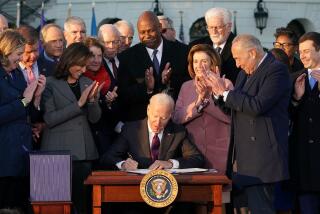Congress Is Urged to Attract Private Investments
- Share via
WASHINGTON — Congress should spend up to $5 billion over the next five years to create a new corporation to help raise private capital for investments in toll roads and other moneymaking public works projects, a congressional commission said Tuesday.
The federally chartered corporation would attract investors by offering insurance and in some cases financing for projects that might otherwise prove too risky to attract investments from pension funds and other private sources, commission members said.
A “national infrastructure corporation” could initially help projects attract $10 in private capital for every $1 spent by the federal government, said Daniel V. Flanagan Jr., chairman of the Commission to Promote Investment in America’s Infrastructure. Eventually, Flanagan said, the figure could rise to $18 in private funds for every federal dollar spent.
The commission, which unveiled its proposal Tuesday at a Capitol Hill press conference, was established by Congress more than a year ago to devise ways to secure private money, particularly from large pension funds, for revenue-generating public works projects, such as toll bridges, toll roads or commuter rail systems. Pension fund managers now control about $4 trillion in assets.
“It’s time to face the facts,” Flanagan said. “Federal taxes . . . won’t be enough to handle all that must be done. State and local governments are not going to raise enough taxes to fill the gap. . . . And the private sector is not going to finance or insure projects that it considers risky.”
The proposal is of special interest in California, where federal and state officials have authorized several private toll road projects, including three in Orange County. Transportation officials in Orange County have complained in the past that the lack of federal loan guarantees has made raising private money for the projects a daunting task.
Rep. Norman Y. Mineta (D-San Jose), chairman of the House Committee on Public Works and Transportation, said Congress will give the commission’s proposal serious consideration. He noted, however, that there might be “significant resistance” to a spending proposal that calls for $1 billion a year over the next five years.
To help make public works projects more attractive to investors, the commission proposed that the new corporation engage in four major activities. For a fee, it would insure bonds used to finance construction projects that might not otherwise qualify for insurance from private vendors. It would insure private businesses and local or state governments for the cost of developing potentially risky projects. It would provide limited financing for specific projects that had attracted some, but not all, of needed capital. It eventually would issue its own bonds to finance a pool of public works projects.
More to Read
Sign up for Essential California
The most important California stories and recommendations in your inbox every morning.
You may occasionally receive promotional content from the Los Angeles Times.












